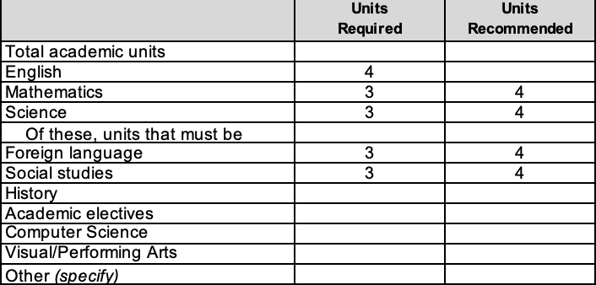Tufts University Admissions Profile

Introduction
Welcome to our comprehensive guide on the Tufts University admissions profile. If you're considering applying to Tufts, this article will provide you with all the essential information you need to know. From admission requirements to the application process, scholarships, and campus life, we've got you covered. Let's dive in and explore what makes Tufts University such a prestigious institution.
Tufts University Admissions Profile
Tufts University is a renowned private research university located in Medford, Massachusetts. Established in 1852, Tufts is recognized for its academic excellence, innovative research, and commitment to social impact. With its interdisciplinary approach and global perspective, Tufts offers a unique educational experience that prepares students to make a difference in the world.
Below are tables highlighting how Tufts evaluates each applicant through information published in the Common Data Set, a resource that compiles a standardized list of data items provided by universities about their admissions profiles.
Distribution of high school units required and/or recommended

Relative importance of each of the following academic and nonacademic factors in your first-time, first-year, degree-seeking general (not including programs with specific criteria) admissions decisions

SAT and ACT Policies


Admissions Requirements
To gain admission to Tufts, applicants must meet certain requirements. Here are the key factors considered during the admissions process:
-
Academic Excellence: Tufts seeks students who have demonstrated academic excellence. This includes a strong high school curriculum, excellent grades, and a competitive GPA. Admissions officers also consider the rigor of your coursework and your performance in advanced or honors classes.
-
Standardized Test Scores: While Tufts takes a holistic approach to admissions, SAT or ACT scores play a role in the evaluation process. It's recommended that applicants aim for scores within or above the middle 50% range of admitted students. Tufts also considers SAT subject test scores for certain programs.
-
Transcripts and Coursework: Admissions officers review applicants' high school transcripts to assess their course selection, performance, and academic growth over time. They look for students who have challenged themselves academically and have excelled in their chosen areas of study.
-
Essays and Personal Statements: Tufts requires applicants to submit essays and personal statements that provide insights into their character, experiences, and aspirations. These essays allow you to showcase your personality, reflect on your journey, and demonstrate your fit with Tufts University.
The Application Process
Applying to Tufts involves several steps, and it's important to stay organized throughout the process. Let's walk through each stage of the application process:
1. Common Application or Coalition Application
Tufts accepts both the Common Application and the Coalition Application. Choose the application platform that you are most comfortable with and complete the application form accurately, including personal information, academic history, and extracurricular involvement.
2. Supplemental Essays
Tufts University places a great deal of importance on the supplemental essays in its admissions process. It utilizes these essays as a means to understand each applicant beyond their academic achievements and test scores, getting a glimpse of their personal character, intellectual curiosity, and commitment to their respective fields of interest.
The Tufts University admissions process usually involves two to three supplemental essays. This requirement varies depending on the specific program to which an applicant is applying. Regardless, every Tufts applicant must craft responses that showcase their unique qualities and depth of thought.
Typically, Tufts University provides prompts designed to enable applicants to demonstrate their critical thinking skills, creativity, and passion for their intended major. The essays aim to reveal the applicant's ability to contribute to the university's vibrant community of scholars and learners.
One of the standard prompts is the "Why Tufts?" essay, which asks students to explain their interest in Tufts University specifically. This prompt invites applicants to delve deep into their motivations for choosing Tufts and allows the admissions committee to evaluate whether the student's goals align with the university's mission and values.
Tufts also often includes a prompt asking about the applicant's chosen field of study. This essay assesses an applicant's genuine enthusiasm for their major and their potential to excel in it. It requires a thoughtful explanation of how their academic and extracurricular experiences have shaped their interests and ambitions in this field.
A third prompt, which changes year-to-year, is usually designed to showcase the applicant's creativity, innovative thinking, or ability to problem-solve. This could range from ethical dilemmas to creative writing tasks, all designed to let applicants demonstrate their skills and potential beyond the conventional confines of a traditional application.
Tufts University expects all supplemental essays to be cogently written, insightful, and reflective of the applicant's personality. These essays serve as the applicant's opportunity to stand out from thousands of other students with similar grades and scores. Thus, it is advisable to start brainstorming and drafting these essays well in advance of the application deadline to give ample time for revising and refining.
Remember, Tufts University values authenticity and individuality, so it's important to allow your unique voice to shine through in your responses. The best essays often provide a glimpse into your experiences, values, and aspirations, connecting them meaningfully with the opportunities you expect to explore at Tufts University.
Sample Essays
Tufts supplemental essays change slightly year to year but the 2022-2023 examples below should provide an excellent framework for what Tufts looks for in a star candidate.
Prompt: Which aspects of the Tufts undergraduate experience prompt your application? In short, "Why Tufts?"
Answer:
My interest in Tufts began with bubbles. On a campus tour, our guide talked about blowing bubbles with her roommate at 1am and watching them freeze. The tour was actually five years ago when I accompanied my sister on a campus visit. This story highlights what excites me about going to Tufts: the students share an intellectual curiosity that carries beyond the classroom into the friendships and memories they create. After imagining myself at Tufts for five years, I can clearly see myself there. I will use my own intellectual curiosity to research infectious diseases in Dr. Aldridge’s lab, learn about nuclear nonproliferation in Nuclear Weapons and International Politics, and teach Climate Action workshops on the climate change-social justice intersection. Although my interests are diverse, I know Tufts will not only support my freedom to explore, but encourage it.
Prompt: It’s cool to love learning. What excites your intellectual curiosity?
Answer:
Diseases intrigue me more than anything. My interest started in sixth grade when I learned about a small Ebola outbreak in West Africa. Every day I would go straight home from school and Google news articles about the outbreak. Ebola both terrified and fascinated me. My sixth-grade self worried the outbreak would consume the entire region and never stop spreading. I was fascinated by how such a small virus could cause such irreparable damage. The methods Doctors Without Borders and the WHO employed to try and contain the virus also caught my attention. I took note of what worked and what didn’t. I was also very surprised by the lackluster global response to the outbreak.
My interest in Ebola led me to learn about other diseases. After studying Zika, MERS, Nipah, and hemorrhagic diseases such as Lassa Fever, I have realized that the world is grossly underprepared for the next pandemic. Other global issues such as climate change will only exacerbate disease outbreaks. For example, rising temperatures will allow mosquitoes to have a greater range and cutting down forests will expose us to zoonotic diseases. Even the richest nations do not invest enough in disease surveillance and many nations do not have the infrastructure to deal with a large-scale outbreak.
Whether I am petitioning world governments or researching new vaccines, I want to help prepare the world for the next pandemic. That's why my dream job is to study and raise awareness about diseases as an epidemiologist.
Prompt: How have the environments or experiences of your upbringing – your family, home, neighborhood, or community – shaped the person you are today?
Answer:
The last sliver of the sun disappears over a perfect wave as I ride toward shore.
My beautiful home should have made me an idealist, but no…
I’m a pessimist.
I was raised on science, not faith, and pessimism is a possible side effect.
I brush my teeth, climb into bed, and think about our future rising sea levels and supervolcano eruptions. I can’t ignore the fish migrations caused by climate change that will ultimately doom my home and, eventually, our world. But, though I know the world is doomed, I love this world, and I’d do anything to prevent it from utter destruction.
I joined forces with my sworn enemies, the optimists, with Heal the Bay’s Pier Aquarium and MPA watch, spreading messages of environmental protection while teaching the community about ocean creatures and monitoring wrongdoing at local beaches.
I intensified my battle by interning with UCLA’s LCC Civil and Environmental engineering lab, which designs sustainable building materials. My project focused on the dissolution kinetics of calcite with organic ligands at high pH to simulate cementitious environments, and my results have applications for sequestering CO2.
Knowing the future doesn’t make me want to give up, instead it makes me want to test the limits of what I can accomplish. Unlike my optimistic counterparts, I have accepted what’s coming, so I’ll be ready, at least more ready than anyone else, to stop the unstoppable.
And if I fail, what does it matter? That asteroid was totally coming anyway!
3. Letters of Recommendation
Tufts typically requires two letters of recommendation from teachers, counselors, or other individuals who can speak to your academic abilities, character, and potential for success at the university. Choose recommenders who know you well and can provide specific examples of your achievements and qualities.
4. Standardized Test Scores
Tufts has implemented a test-optional policy for the 2022-2023 and 2023-2024 admissions cycles. This means that submitting SAT or ACT scores is optional. However, if you believe your scores are a meaningful reflection of your academic abilities, you may choose to submit them. Tufts will evaluate your application holistically, focusing on other aspects such as coursework, essays, and recommendations.
5. Application Fee or Fee Waiver
There is an application fee to submit your application to Tufts. However, fee waivers are available for eligible students who demonstrate financial need. Check the Tufts admissions website for specific details and instructions on obtaining a fee waiver.
6. Deadlines
Understanding application deadlines is crucial in the college admissions process, and Tufts University is no exception. It's essential to keep track of these dates, as missing a deadline can significantly impact an applicant's chance of admission.
Tufts University offers three application rounds: Early Decision I, Early Decision II, and Regular Decision. All first-year applicants can apply to Tufts via the Common Application, Coalition Application, or QuestBridge Application. Here's a closer look at the specific deadlines:
-
Early Decision I (ED I): Students applying under this binding early decision program are expected to submit their applications by November 1. The ED I applicants are typically notified of their admissions decision in mid-December. This option is most suited for applicants who have Tufts as their first choice and are committed to attend if accepted.
-
Early Decision II (ED II): For students who decide a bit later that Tufts is their first choice, they can apply under the Early Decision II option. The application deadline for ED II is January 1, with admissions decisions typically released by mid-February. Like ED I, this is also a binding decision plan.
-
Regular Decision (RD): For those opting for a traditional timeline, the Regular Decision deadline is January 1. Regular Decision applicants can expect to receive their admissions decisions by late March or early April. If accepted, students have until May 1, the National Candidates Reply Date, to make their final decision.
International students, transfer students, and the Spring Transfer Option (STO) applicants also need to be mindful of their respective deadlines. Generally, the deadline for international students aligns with the Regular Decision deadline. Transfer applicants usually have until March 15 for Fall admission and November 1 for Spring admission.
Tufts University's application deadlines can vary slightly from year to year, so applicants are encouraged to confirm these dates on the university's official admissions website. It's also important to note that financial aid applications have separate deadlines, so students applying for aid should be sure to track those as well.
In summary, being aware of and meeting all application deadlines is a crucial step towards a successful admission process at Tufts University. It shows the admissions committee your ability to plan, be accountable, and adhere to the rules—qualities that can set a strong precedent for your time in college.
Scholarships and Financial Aid
Tufts University is committed to providing access to education and offers various scholarships and financial aid options to assist students. Here are a few examples:
-
Merit-Based Scholarships: Tufts offers several merit-based scholarships that recognize outstanding academic achievements, leadership qualities, and extracurricular involvement. These scholarships are awarded based on the overall strength of the applicant pool.
-
Need-Based Financial Aid: Tufts is dedicated to meeting the demonstrated financial need of admitted students. By submitting the CSS Profile and the Free Application for Federal Student Aid (FAFSA), students can be considered for grants, loans, work-study programs, and other forms of financial assistance.
-
External Scholarships: There are also external scholarship opportunities available to Tufts students. Research and apply for scholarships offered by organizations, foundations, and community groups that align with your interests and qualifications.
Campus Life and Resources
Tufts University offers a vibrant campus life with a wide range of resources and opportunities for students to engage in. Here are some highlights:
-
Academic Excellence: Tufts is home to world-class faculty who are leaders in their fields. With a broad range of academic programs and interdisciplinary studies, students have the flexibility to explore their interests and pursue unique academic paths.
-
Research Opportunities: Tufts encourages undergraduate students to engage in research across various disciplines. Through partnerships with faculty members, students can participate in groundbreaking research projects, gain hands-on experience, and contribute to new discoveries.
-
Community Engagement: Tufts is committed to active citizenship and social impact. Through programs like the Tisch College of Civic Life, students can connect with local communities, engage in service-learning initiatives, and make a positive difference in society.
-
Student Organizations and Activities: Tufts offers a diverse range of student organizations, clubs, and extracurricular activities. Whether you're interested in academic clubs, cultural organizations, performing arts, or sports, there are numerous opportunities to get involved, pursue your passions, and build lifelong connections.

Frequently Asked Questions
What is the acceptance rate at Tufts University?
The acceptance rate for Tufts University varies each year and depends on the applicant pool. It is generally competitive, with an average acceptance rate of around 15-16%.
Does Tufts University require interviews for admission?
What majors and programs are offered at Tufts University?
Tufts offers a wide range of undergraduate majors and programs across various disciplines, including arts and sciences, engineering, business, and more. Explore the Tufts University website for a comprehensive list of available majors.
Conclusion
Tufts University offers a transformative educational experience that combines academic excellence, innovative research, and a commitment to social impact. By understanding the Tufts University admissions profile, you can navigate the application process with confidence. Best of luck as you embark on this exciting journey towards an exceptional education at Tufts University.
